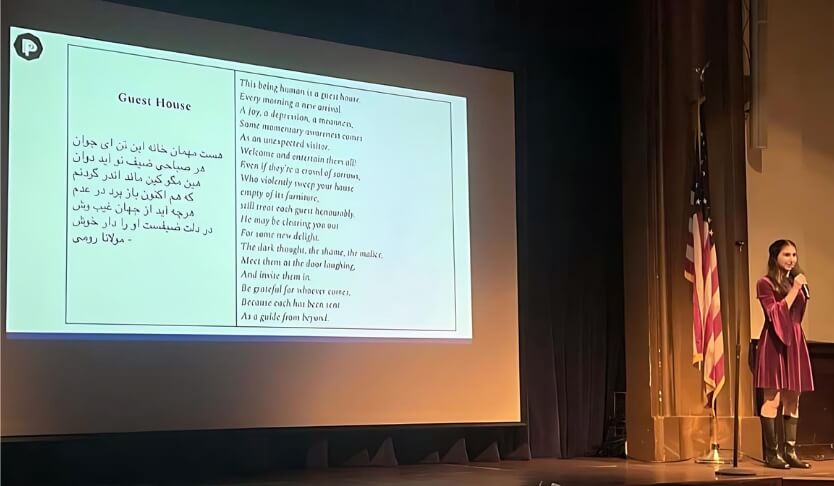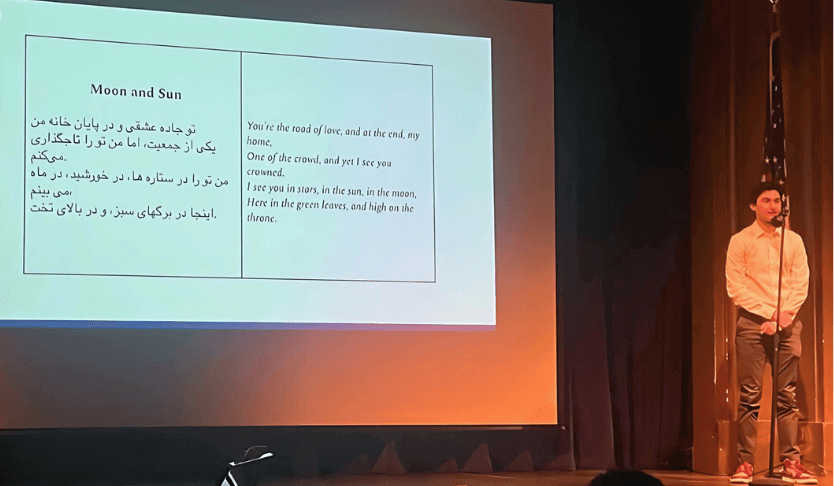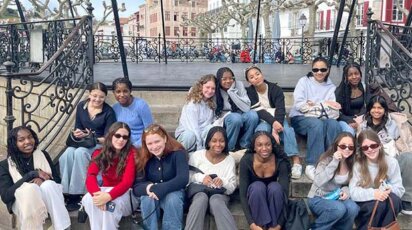News
Reflections on Rienzi Poetry Showcase
On February 23, 2024, the Upper School hosted its annual Rienzi Poetry Showcase. Named after Ms. Kathy Rienzi, a former French teacher who taught at Poly for over 20 years, the Rienzi Poetry Showcase offers generations of students a platform to display their commitment to the study of world languages, and showcases the culturally-vast landscape of our community, expressed in memorable pieces of literature and music.
Students choose and recite the works of poetry and song that they gravitate towards for a variety of reasons, often due to their own cultural heritages, demonstrating that the study of linguistics, art, and literature is deeply personal. Among them is Neeka Aghazadeh ’27, who in her fifth year as a participant, performed Rumi’s “Guest House” in Farsi, sharing the stage with her older brother, Parsa, a member of the Class of 2025.
“I grew up speaking Farsi. The language is a reminder of home whenever I speak it.”
Enjoy this reflection by Neeka as she shares her personal experience of participating in the Rienzi showcase and how this Poly tradition is like a fabric, woven to connect us all.

“Guest House” by Rumi: A 13th Century Poem in Farsi
by Neeka Aghazadeh ’27
My family is from Iran, located in the Middle East. Iran is known for its unique cuisine and timeless poetry. While I have never been to Iran, we keep the culture alive in our home by cooking traditional dishes like Polo Khoresht and Faloodeh and celebrating holidays together like Noruz, the Persian New Year. At least once a year, we visit family, where a mix of English and Farsi floats around the house. I grew up speaking Farsi. The language is a reminder of home whenever I speak it.
I started participating in the Rienzi assembly in Grade 5, after realizing how little was known of Iran. In previous years to help me practice, my mom who grew up in Iran, would record herself reading the poem I selected, and I would use the audio of her voice to memorize the piece. She encourages me to continue speaking about Iran and to share the stories of peoples’ lives told through poetry, because through this sharing we stay connected to our culture.
Farsi is a very romantic language, most poems in the language are about love. Rumi was a very famous Afghan poet who wrote a lot of poetry in Farsi, a language also spoken in Afghanistan. In “Guest House” by Rumi, love is a strong presence that remains, despite the initial impressions of the title. The first line reads: “This being human is a guest house. Every morning a new arrival.” Later in the poem, Rumi writes about visitors and says, “Meet them at the door laughing, And invite them in.” Rumi tells the reader to greet their guests laughing and with joy, as the guests we invite into our homes are people we love. The poem brings appreciation and love for those around us, and makes us re-experience the feeling of being with your family and loved ones. I chose this poem for its content and peaceful tone; it spoke to me and offered me comfort that I wanted to share with the rest of our community.

After choosing my poem, it was time to start memorizing it. Unable to read off the page and memorize the poem in a traditional way, I found a recording of the poem in Farsi and used that to practice. I wrote out a “Fargilensi” translation for myself—I took out a piece of paper and wrote down what I heard. The result was English letters formed to make Farsi words and sounds. I memorized from the page and then eventually, practiced what I had memorized. I practiced on bus rides and minutes before I presented. My goal was to convey the right intonation so that my peers would understand the emotion behind the poem’s words despite the language barrier that existed. I wanted to reach the audience like the poem reached out to me. By the time I presented, I felt confident in my abilities to recite it seamlessly, and so I did.

After coming off the stage, I watched my brother present his poem, an excerpt from the poetry book written by Rumi called “Moon and Sun.” The particular piece that my brother read was titled “You’re the Road of Love,” and was about seeing home and comfort within the people you love.
After my brother spoke, I continued to watch the rest of the assembly and listened as other participants spoke and sang in many other languages. In our community, there are so many languages, experiences, and ways that words can be woven to make new pieces, and I believe that being on the Rienzi stage is the key to keeping those stories alive.
“The Guest House“
by Jalaluddin Rumi
Translated by Coleman Barks
This being human is a guest house.
Every morning a new arrival.
A joy, a depression, a meanness,
some momentary awareness comes
as an unexpected visitor.
Welcome and entertain them all!
Even if they’re a crowd of sorrows,
who violently sweep your house
empty of its furniture,
still, treat each guest honorably.
He may be clearing you out
for some new delight.
The dark thought, the shame, the malice,
meet them at the door laughing,
and invite them in.
Be grateful for whoever comes,
because each has been sent
as a guide from beyond.




